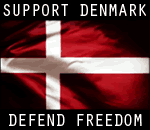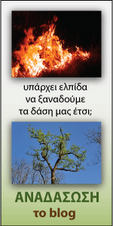Χμ, επίκαιρο μου ακούγεται... (τα bold δικά μου).The democratisation of information unleashed by the internet—now increasingly connected to mobile phones and other portable devices—has been gloriously chaotic. According to one count, 80,000 new blogs (online journals) are now created each day. But in 2006 more big companies will muscle in, and rules of sorts will start to spread.
Participatory information sites and channels will blossom, with “citizen-reporters” busying themselves not only in writing and in sound through podcasting, but also with images using digital cameras and phones. As well as supplying leads and feeds for conventional media (witness the remarkable video images of the aftermath of last July’s London bombings captured by surviving passengers on their mobile phones), these will develop their own mass through their range of reporting. And as corporations follow the example of Microsoft and others in buying into the blogosphere, sites will emerge with resources far beyond those of the original individual exponents of the genre. These mega-blogs will become part of an interconnected information universe that will increasingly move editing from the traditional newsroom to the recipient’s computer.
The essence of the original blogs was that they were individual expressions of information and opinion, however eccentric or extreme. This raised an obvious credibility question. Some blogs may have been accurate, but many more clearly come off the wall. For every dissection of the CBS report on President Bush and the National Guard, we had 1,000 rants and 100,000 accounts of daily activities of interest to nobody except the author. The limits of the free-for-all were well demonstrated by the chaos that resulted when the Los Angeles Times opened its online editorial page to unrestricted contributions.
Such problems will encourage the growth of a more responsible online-information system that exploits the medium’s possibilities, but which also adheres to self-imposed standards that would have been seen as unacceptably restrictive by the original bloggers. The idea that the internet meant complete freedom will have to die in at least a part of the forest if the medium is to realise its potential as an information tool. Serious providers will have to accept that they are not free from responsibility.
This will not come about primarily through any legal constraints, which remain cloudy in the blogosphere. Rather, a group of information websites will emerge from the world of blogs—small in relative number, but weighty in impact—which accept that the internet is not just a licence to peddle prejudices and pursue individual interests. The hierarchy of links pioneered by Google will become a key factor, discriminating in the good sense between the reliable and the dross, and creating a virtuous online circle. Thus can brands be built.
This will present newspapers, already hit by declining circulations, with an extra challenge, and the growth of video and audio feeds from citizen-reporters will drive at least the smaller broadcasters to try to co-opt them as contributors. Conventional media enterprises will have to find creative ways of drawing on the proliferating sources of content and channels of distribution to satisfy their customers. If they do not adapt, fast, they may all too easily find themselves overshadowed as new media come of age, taking their responsibilities seriously and exploiting new ways of connecting with consumers.
Source: From blogs to brands, by Jonathan Fenby. Published in The World in 2006, © 2005 The Economist Newspaper Limited.
Πρωτοδημοσιεύθηκε στο BusinessWriter.
Πέμπτη, Ιανουαρίου 05, 2006
From Blogs to Brands: Out of chaos a new order
Αναρτήθηκε από Sakis Rizos στις 1/05/2006 06:27:00 μ.μ.
Εγγραφή σε:
Σχόλια ανάρτησης (Atom)
Blog Archive
-
►
2016
(1)
- ► Φεβρουαρίου (1)
-
►
2012
(1)
- ► Ιανουαρίου (1)
-
►
2011
(21)
- ► Φεβρουαρίου (4)
- ► Ιανουαρίου (4)
-
►
2010
(59)
- ► Δεκεμβρίου (3)
- ► Σεπτεμβρίου (6)
- ► Φεβρουαρίου (5)
- ► Ιανουαρίου (3)
-
►
2009
(79)
- ► Δεκεμβρίου (6)
- ► Σεπτεμβρίου (8)
- ► Φεβρουαρίου (10)
- ► Ιανουαρίου (11)
-
►
2008
(189)
- ► Δεκεμβρίου (24)
- ► Σεπτεμβρίου (17)
- ► Φεβρουαρίου (22)
- ► Ιανουαρίου (15)
-
►
2007
(375)
- ► Δεκεμβρίου (14)
- ► Σεπτεμβρίου (19)
- ► Φεβρουαρίου (46)
- ► Ιανουαρίου (46)
-
▼
2006
(499)
- ► Δεκεμβρίου (45)
- ► Σεπτεμβρίου (45)
- ► Φεβρουαρίου (46)
-
▼
Ιανουαρίου
(41)
- Έτος προκλήσεων για τη διεθνή και Ελληνική οικονομ...
- Νέο όχι στους ΓΜΟ από το Υπουργείο Αγροτικής Ανάπτ...
- Libertas no5
- Οι Ζαπατίστας δοκιμάζονται και στην Ελλάδα
- you'll miss it when it's gone
- Σαββατο βραδυ στην ακρη της πολης
- Συνοπτική Ιστορία της Ελληνικής παιδείας από το 15...
- Με τετοια επιτροπη για τα ανθρωπινα δικαιωματα...
- Οι ωραίοι έχουν (όχι χρέη) έλλειμμα
- Ανάγκη; Επιθυμία; Θύμα!
- Απο την αναρχια στο ελαχιστο κρατος
- Το DNA αθωώνει μετά θάνατο;
- Ανοικτές Αγορές και Δημοκρατία:
- Θρησκεία και Επιστήμη
- Σχέσεις Κράτους και Εκκλησίας στο Βυζάντιο
- Εσπειρες ανεμους, θα θερισεις θυελλες!
- Γιατί φωνάζουν στον Περισσό;
- Σύνταξη από τη λογική
- Ο κ. Καραμανλής, ο Μαρξ και Αριστερά
- Rooster Review 10-12/2005
- Επιτελους η Αθηνα εχει δημαρχο!
- Απαιτουμε σεβασμο των αξιων μας απο τους μεταναστες?
- Γιατί και ποια μεταρρύθμιση στην ανώτατη εκπαίδευση
- Ο Κόσμος το 2006
- Διαφημισεις!
- Green is the new red, white and blue
- Βαρώτσος, σεισμός & IEEE Spectrum
- Γραφειοκρατία και Παιδεία ως δημόσιο αγαθό, παραγω...
- 10 χρόνια από το θάνατο του M.N. Rothbard
- Συνεισφέρετε στην ιατρική έρευνα δίχως κανένα κόστος!
- Η αβάσταχτη ελαφρότητα της πολιτικής των δημοσκοπή...
- Τροχαία στην Ελλάδα
- Η Ευρώπη στο άγνωστο με βάρκα την ελπίδα
- From Blogs to Brands: Out of chaos a new order
- 3 Εκατομμύρια από τον κ. Νίκο Δήμου
- Κου-Κλουξ-Κλαν-Κρήτης!
- Ελληνική εκπαιδευτική πύλη
- Στο έτος 2036
- Διοικηση επιχειρησεων εναντιον Οικονομικης Επιστημης
- Μα καλα, ακομα τρεχετε στην ΔΕΗ και τον ΟΤΕ?
- Αφιέρωμα του Economist στις Πατέντες
-
►
2005
(425)
- ► Δεκεμβρίου (37)
- ► Σεπτεμβρίου (41)
- ► Φεβρουαρίου (20)
- ► Ιανουαρίου (18)
Contributors
- Alkis Ioannidis
- Anarchocapitalist
- Andrew
- Chrysotheras
- Fuchsia
- Harry Peitsinis
- Joe
- John 25aris
- Kokkoras
- Leviathan
- Manoliscus
- NTG
- Nievskii
- Roark
- S G
- Sakis Rizos
- Thrass
- Αθ. Αναγνωστoπουλος
- Αθήναιος
- Γ.Σαρηγιαννίδης
- Σκεπτικιστης
- Στέφανος Αθανασιάδης
- Τηλέμαχος Χορμοβίτης
- avatar
- cobden
- kouk
- libertarian
- mantz
- pinky and the brain
- space-navigating
- subterranean
- zanat0s
-
Ελληνικοι Συνδεσμοι
- Φιλελεύθερη Συμμαχία
- Greek Liberals - Φιλελεύθερη Συμμαχία
- Liberal Alliance - Φιλελεύθερη Συμμαχία
- Κέντρο Φιλελεύθερων Μελετών
- Οικολόγοι-Πράσινοι
- Δημοκρατικοί
- Οι Φιλελεύθεροι
- Κόμμα Ελευθερίας & Δικαιοσύνης Ελλάδας
- Δράση
- Forum για την Ελλάδα
- Πορτοκαλί 2010
- Presscode
- Εταιρία Κοινωνικών και Οικονομικών Μελετών
- Προοδευτική πολιτική
- Επίκεντρα
- Αγορά Ιδεών
- Διαρκής Μεταρρύθμιση
- Anatheorisi.org
- Greek University Reform Forum
- Κίνηση "Παιδεία για Δημοκρατία και Ανάπτυξη"
- Αξιολόγηση Βουλευτών
- wiki για το Ασφαλιστικό (Reality Tape)
- Η Τυρρανία των Καλών Προθέσεων
- G700
- Atheoi.org
- Libertarians in Greece
- We support Freedom of Speech and Anonymity for Greek Blogs
- Πάρκα Παντού!
- Όχι νέοι φόροι!
- Πρωτοβουλία για την Πρόσβαση στα Δημόσια Δεδομένα
- Ανδρέας Ανδριανόπουλος
- Andreas Andrianopoulos Appreciation Society
- Στέφανος Μάνος
- Πέτρος Τατούλης
- Πάσχος Μανδραβέλης
- Νίκος Δήμου
- Κυριάκος Μητσοτάκης
- Μανώλης Βασιλάκης
- Μίμης Ανδρουλάκης
- Γιάννης Λάριος
- Tάκης Μίχας
- Άρης Χατζής
- Χαρίδημος Τσούκας
- Κωστής Χατζηδάκης
- Ντόρα Μπακογιάννη
- Κώστας Κουκόπουλος
- Φώτης Περλικός
- Fearsociety
- Ο Νεοφιλελεύθερος
- Libertatia
- Υπάρχουμε... Συνυπάρχουμε;
- Παρατηρήσεις...
- Business Writer
- No Guts, No Glory
- The Pinky And The Brain
- So What!
- Greek Forum
- Versutia
- It's the economy
- Athens FreePaper
- Libertinos
- Αναιδώς
- North Michigan Avenue
- Tory Anarchist
- StepDance.gr
- Oikonomika Blog
- Anarchism
- Συνιστολόγιο
- The Night Of The Stormrider
- Σουφραζέτα
- λ:ηρ
- Που πας ρε Καραμήτρο!
- Exastal
- Πολιτεύομαι!
- Έτσι το βλέπω
- Φιλελεύθερη Λαλιά
- Deecitizenstalks
- Αθήναιου Βορβορυγμοί
- Λογικό
- Love in Snow
- Greek Netizen
- e-Πλάτανος
- Canis Libertatis
- Φιλελεύθερο Ζάντε
- Liberal Daltons
- Αυτοεξόριστος
- Stelpas
- Laissez Faire
- Απαλλαγή από το μάθημα θρησκευτικών
- Πράσινος Φιλελευθερισμός
- Φιλελεύθερο Ιόνιο
- Κίνηση Οικονομικής Ανάπτυξης
- Κίνηση Κοινωνικής Συνοχής
- Κίνηση Μεγάλης Βρετανίας
- Φιλελεύθερη Αθήνα
- Φιλελεύθερη Θεσσαλονίκη
- Φιλελεύθερη Αττική
- Φιλελεύθερη Κεντρική Μακεδονία
- Φιλελεύθερη Ανατολική Μακεδονία και Θράκη
- Φιλελεύθερη Δυτική Μακεδονία
- Left Liberal Synthesis
- Μέτικου Λεξικό
- Είναι καιρός...
- Πράσινοι Φιλελεύθεροι
- Tall Athens
- Ελληνικό Καθεστώς
- Σελίδες φιλελεύθερης σκέψης
- Αντικειμενιστής
- e-left
- Κρυμμένες Αλήθειες
- Καγκελάριος
- Liberal Greek
- Fresh24
- Liberal Socialism
- μία δε κλίνη κενή φέρεται εστρωμένη των αφανών
- Λιανοκλάδι
- Koblopoulos
- Keynesfriedman
- Real Politics
- Liberalism.gr
- Οι Εγκάθετοι
- Politicking Baby
- Aλήθειες για το φιλελευθερισμό
- Το Σύνταγμα της Ελευθερίας
- Κοντά στον ουρανό
-
Διεθνεις Συνδεσμοι
- Φιλελεύθερο Forum
- Heritage Foundation
- Ίδρυμα John Locke
- Ινστιτούτο Ludwig von Mises
- Ινστιτούτο Cato
- free-market.net
- Το Κέντρο Αντικειμενισμού
- The Independent Institute
- Το Ινστιτούτο Ayn Rand
- National Center for Policy Analysis
- The Science & Environmental Policy Project
- The National Center for Public Policy Research
- Το Ίδρυμα Οικονομικής Έρευνας Atlas
- The Ronald Coase Institute
- The Free Africa Foundation
- The Online Library of Liberty
- Foundation for Research on Economics & the Environment
- GreenLiberty.org
- Center For Global Food Issues
- Property and Environment Research Center
- National Wilderness Institute
- Capitalism Magazine
- Reason online
- The CATO Journal
- Regulation
- The Hoover Digest
- The Intellectual Activist
- Victor Davis Hanson
- David Friedman
- Tom Palmer
- Asymmetrical Information
- Cafe Hayek
- Virginia Postrel
- Global Growth Blog
- The Liberal Order
- Protein Wisdom
- Atlas Shrugs
- The Rule of Reason
- The Becker-Posner Blog
- Positive Externality
- Liberty for Cuba
- Rational View
- Instapundit
- Little Green Fooballs
- Cox & Forkum
- Chicago Boyz
- Rebellion Coffee
- Libertarian Leanings
- Positive Liberty
- The Liberty Papers
- Το Ινστιτούτο Fraser
- A Canadian Econoview
- Spirit of Man
- Winds of Change
- Filibuster Cartoons
- Blue Balloon
- Center for Research and Development
- Instituto Ecuatoriano de Economia Politica
- Fundation Libertad
- CEDICE Libertad
- El Liberal Venezolano
- Laissez-Faire
- Y todo lo demas
- Valete Fratres!
- Instituto Liberal
- Liberal-punto-ar
- Libertimus
- BlogBis
- Sine Metu Reloaded
- En defensa del neoliberalismo
- Το Ινστιτούτο Ελευθερίας και Δημοκρατίας
- Institutional Economics
- The Center for Independent Studies
- The Rathouse
- Το Ινστιτούτο Οικονομικών Υποθέσεων
- Ινστιτούτο Adam Smith
- Stockholm Network
- Transparency International
- The Globalization Institute
- Social Market Foundation
- The David Hume Institute
- Libertarian Alliance
- Society for Individual Freedom
- Liberal International
- iGreens.org.uk
- The Economist
- New Economist
- An Englishman's Castle
- Christopher Hitchens
- Nanny Knows Best
- Freedom and Whisky
- Lib on the United Kingdom
- The road to Euro Serfdom
- Open Republic Institute
- The Freedom Institute
- Irish Eagle
- Atlantic Blog
- Liberala Partiet
- Folkpartiet Liberalerna
- Moderaterna
- Timbro
- Forum for Fair and Free Trade
- Stockholm International Peace Research Institute
- Bertil Ohlin Institute
- Eudoxa
- Ratio Institutet
- Captus
- Nyliberalen
- The Freedom Front
- Marknadkraften
- Liberalismen
- Heureka
- Johan Norberg
- EGO
- Stefan Karlsson
- Johnny Munkhammar
- Moderskeppet
- Simelas
- FRIdemokratene
- Civita
- Bergen Objektivist Forening
- Centre for Social and Economic Research
- Anders Chydenius Foundation
- Copenhagen Consensus
- Libertas
- Copenhagen Institute
- Center for Politiske Studier
- Bjorn Lomborg
- Econotrix
- Punditokratene
- A Fistful of Euro
- European Freestate Project
- Causa Liberal
- A Mao Invisivel
- Por la libertad
- El rincon de la libertad
- Hispalibertas
- The Molinari Institute
- Les circles liberaux
- Alternative Liberale
- Generation Libre
- Liberte Cherie
- La Page Liberale
- Institut Hayek
- Alain Genestine
- Το Κέντρο για τη Νέα Ευρώπη
- Libertarian International
- LYMEC
- Liberal Archive
- Teldersstichting
- Ayaan Hirsi Ali
- Vrijbrief
- Libertarian.nl
- Freie Demokratische Partei
- Levantinismos
- Friedrich-Naumann-Stiftung
- Stiftung Marktwirtschaft
- Transatlantic Forum
- Statler & Waldorf
- Objektivismus
- Liberales Institut
- Pro Libertate
- Hayek Institut
- Liberty Ideas
- Liberální Institut
- Foundation for Market Economy
- Hayek Tarsasag
- F.A. Hayek Foundation
- Centre for Political Thought
- Libertarianizm
- Lithuanian Free Market Institut
- Estonian Reform Party - Liberals
- Institute of Economic Analysis
- Cato.ru
- AynRand.ru
- The Adam Smith Society
- Το Ινστιτούτο Bruno Leoni
- Centro Einaudi
- Free Thoughts
- Adriatic Institute for Public Policy
- Liberals of Serbia
- Center for Liberal-Democratic Studies
- Free Market Center
- Albanian Center for International Trade
- Albanian Liberal Institute
- Liberal Party of Macedonia
- Liberal Democratic Party
- Ohrid Institute for Economic Strategies
- Association for Modern Economy
- Movement for Rights and Freedoms
- Institute for Market Economics
- Centre for Social Practices
- Centre for Liberal Strategies
- Association For Liberal Thinking
- Objektivist Hareket
- Free Iran News
- Alternate Solutions Institute
- AnarCapLib
- Centre for Civil Society
- Center for Free Enterprise
Referrers
Based on original Visionary template by Justin Tadlock
Visionary Reloaded theme by Blogger Templates | Distributed By Magazine Template

























0 σχόλια:
Δημοσίευση σχολίου